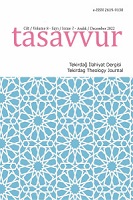علة الاحتياج عند متقدمي المتكلمين ومسألة بقاء الأعراض: دراسة تحليلية نقدية للتقرير المشهور عند المتأخرين
The Cause of Dependence in Classical Kalam and the Persistence of Accidents: A Critical Analysis of the Post-Classical Account
Author(s): Abdurrahman Ali MİHİRİGSubject(s): History of Islam, Contemporary Islamic Thought, Sociology of Religion, Qur’anic studies
Published by: Tekirdağ Namık Kemal Üniversitesi İlahiyat Fakültesi
Keywords: Cause of dependence; contingency; possibility; origination; classical Ashʿarī kalam; Muʿtazilism;
Summary/Abstract: It was widely believed among post-classical thinkers that the classical Mutakallimūn held that the cause of dependence of an effect on a cause was its origination, or a combination of origination and contingency, or its contingency on condition of its origination. Some post-classical thinkers, led by alSayyid al-Sharif al-Jurjānī, went further by interpreting Abu’l-Hasan alAshʿarī’s denial of the persistence of accidents was a consequence of his view that origination was the cause of dependence. This is because the origination view entailed that the world was no longer in need of the Creator after its origination, and thus, him and his followers sought to deflect this consequence by holding that accidents do not persist, and since the persistence of substances was dependent on those accidents, and accidents do not persist more than one moment, those substances remained in need of the Creator for those accidents after their origination. This article seeks to investigate this analysis of the Shaykh al-Ashʿarī’s view, alongside the leading scholars of his school. After examining the original sources of classical Ashʿarī thinkers, along with the Baṣran Mu’tazila, and the texts of Ibn Sina, it becomes clear that the Ashꜥarīs did not hold that accidents did not persist in order to deflect that purported consequence. Indeed, it becomes clear that they did not hold that origination was the cause of dependence, but rather, that it was contingency. As for the Mu’tazila, they are explicit that the cause of dependence is origination, and that is based on their view on the reality of the nonexistent. Since essences are real in their state of nonexistence, they are not in need of a cause; and everything that obtains for those essences after they come into exist are entailments of that essence; thus, they only stand in need of a cause in their origination, that is, going from nonexistence into existence. Indeed, they are also explicit that effects do not need the Creator after their origination, and they clarified this through a comparison with a builder and a building. Indeed, the classical Ashꜥarīs criticized them for this, just as Ibn Sina did in the Ishārāt wa’l-tanbīhāt, al-Najāt, and al-Shifā. Thus, those post-classical scholars generalized the statement that origination is the cause of dependence to all classical mutakallimūn, and then they interpreted Ashʿarī’s motivation behind the denial of the persistence of accidents in accordance with that. The truth, however, is that his view on accidents is based on contingency, and that is because a substance is possible of persistence and possible of non-persistence, and therefore, it stands in need of cause to determine its state in the subsequent moment. That determination must entail something additional to the substance itself, otherwise, the effect is redundant. That additional property must be an accident, and since it is impossible for an accident to subsist in an accident, it is not possible for an accident to persist, because it is not receptive to the property which entails persistence; meanwhile, it is possible for substances, because they can sustain accidents.
Journal: Tasavvur Tekirdağ İlahiyat Dergisi
- Issue Year: 8/2022
- Issue No: 2
- Page Range: 1225-1273
- Page Count: 49
- Language: Arabic

